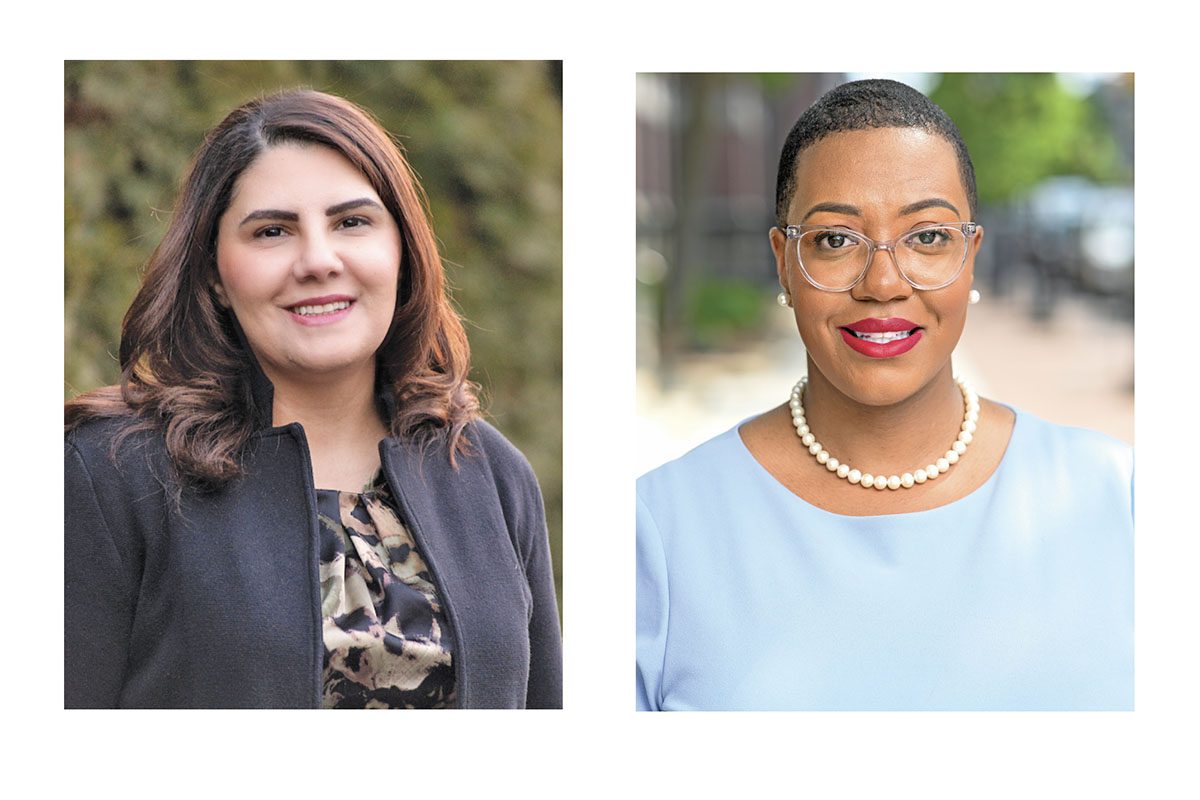Felicia Brabec, who represents Michigan House District 33, is stepping down after two terms to prepare to run for state senate in 2026. That leaves the district encompassing southern Ann Arbor, the city of Saline, and all or portions of Pittsfield, Saline, Lodi, York, Bridgewater, and Scio townships open for a new representative.
Morgan Foreman, thirty-four, was Brabec’s constituent service director until she stepped down to run for the office herself. She says that gave her the “firsthand experience of being by [Brabec’s] side every day and seeing exactly what she does.”
Rima Mohammad, forty-four, is currently an associate professor in the U-M’s Clinical Pharmacy Department and an Ann Arbor Public Schools trustee. If elected, she says, she’ll leave the school board and have to stop working at the U-M “because it’s a public university. So once I’m sworn in, it’s a big career change, right?”

AAPS trustee Rima Mohammad (left) cites her experience as a refugee and academic working on health care issues. Morgan Foreman was state rep Felicia Brabec’s constituent services director before leaving to run for the office herself. | Courtesy of Rima Mohammad and Morgan Foreman.
“I am just a regular working-class person,” says Foreman. “I’m running for state representative to represent the people that I’ve gotten to know over the past three years working in the legislature.” She characterizes Brabec’s work there as “absolutely fantastic” and believes she’ll “vote along the same lines a lot of times.”
“My experience in Lansing makes me a great candidate and the prime candidate,” Foreman continues. “I know how it works because I’ve been there. And so I can hit the ground running.” She says her highest priorities are “greater care for seniors and those in the aging process [and] consumer protection … making sure seniors aren’t vulnerable.”
Mohammad says she’s running because “I have the lived experiences as a [Palestinian] refugee, as a person who went through poverty, as someone who struggled in life, but also my real-world experiences as a health care worker that sees firsthand the problems that’s happening in health care as an educator.”
“I appreciate all her work,” Mohammad says of Brabec’s time in Lansing. Asked how she would continue or change it, she replies, “definitely pushing for mental health initiatives. Definitely trying to find ways where we are addressing gaps—not just necessarily increasing funding but addressing gaps.” She says the most important thing she wants to accomplish is “addressing the issues around health care, especially when it comes to drug prices.”
As school board president, Mohammad oversaw the abrupt termination of superintendent Jeanice Swift last year. Then, in March, an unexpectedly large budget shortfall forced the board to cut more than $20 million from its budget, including laying off 141 employees. She says that she “handled it as calm and collected as possible even in intense times,” and that people’s reactions have been “pretty neutral.”
Related: Ten and Done
Over the Cliff
Foreman says she’s getting a different response. “The public does not seem to be impressed by that, or happy or comfortable” with the schools during Mohammad’s tenure, she says. “I don’t think that it’s helpful to seek another seat when there’s trouble where you’ve been.”
Foreman says she knocks doors “almost every day” and figures she’ll have hit 6,000 by mid-July. “I am thrilled and humbled by the extremely positive reception we have received from voters,” she writes. Mohammad says she’s knocked on even more. “We are confident we will hit 10,000” by mid-month, she emails. She says the response she’s getting “has been very positive.”
County clerk Larry Kestenbaum—who’s also campaigning this year—puts all those doors in context. “Washtenaw is a big county,” he emails. “There are something like 120,000 primary voters, who live behind around 50,000 doors, spread out over 700 square miles.”
Calls & Letters, September 2024:
Schools trustee and state rep candidate Rima Mohammad emailed with a correction and two clarifications to our article about August’s Democratic primary: she is a full professor of clinical pharmacy at the U-M, not an associate professor. She also clarified that the voters she’s talked to are concerned about the school district’s budget crisis–they are only “pretty neutral” about her own role, because “most understand that I am new to the board and many of the issues were occurring prior to my involvement on the school board.” In addition, “I will not be leaving the university until I am sworn into office (if elected). It is a big career change because I am sacrificing my research/academic career. I will still be a practicing pharmacist, but not at a public university or institution.”